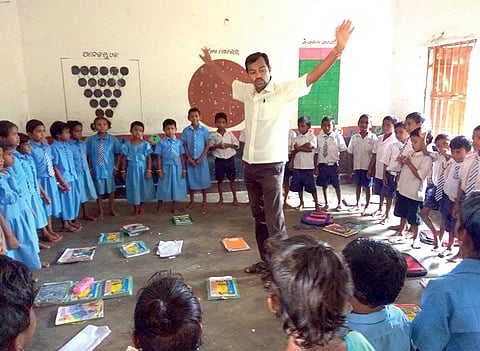Education beyond classrooms
RAYAGADA : Learning in schools can never be limited to just books or classrooms, believes Dwiti Chandra Sahu, a teacher from Rayagada district who was awarded the prestigious National Teachers’ Award by President Droupadi Murmu earlier this week.
In the last two decades of his career as a teacher, Sahu has groomed his students to not just be well-versed in their curriculum but also experts in film-making, music, organic farming, dance and much more. And all this without being completely dependent on the internet.
Sahu - currently a TGT arts teacher at Government (SSD) High school at Billesu, Rayagada, has been teaching tribal students of the district since the last 23 years. But, his lessons go beyond the regular. “Compared to general students, learning level of those from tribal communities is generally low owing to many factors. To improve it, I decided to make the process entertaining and engaging,” said Sahu, who was chosen by the Ministry of Education for the national award for instilling the love of learning in tribal children living in the remote corners of the district. In these 23 years, he has ensured that all his students pick up a new hobby and excel in it along with learning their daily lessons.
Interestingly, prior to being a teacher, Sahu was a newspaper hawker who also pursued journalism for a short period. Hailing from a poor farmer’s family, Sahu earned a degree in education but could not afford higher education. He then decided to sell newspapers to arrange the money and completed twin masters degrees in journalism and Odia before joining a regional news daily. “During the field trips, I realised that education of tribal children needed attention as their low literacy level was also the reason behind their backwardness. But education had to be made interesting to grip their attention,” said Sahu, who joined the ST and SC Development department as a teacher.
His first stint was at Kumbhikata high school run by the ST & SC Development department in 2001 where he introduced the concept of wall magazines and dedicating a day (Saturday) exclusively for co-curricular activities.
Subsequently, he joined Bheja Sevashram where he made visits to post office, cooperative societies, banks, police stations, railway station, hospitals a mandatory component in the school curriculum to acquaint students with the functioning of the government facilities. Besides, he introduced the concept of child reporters and ensured that the best reports or writings by children are published in local dailies.
Adopting innovative teaching practices, Sahu also made sure that every school where he taught had an interesting feature that would complement the learning process. Recently, he established a tribal museum and cultural heritage centre at the Billesu high school to give an insight to the children about their own roots.
With internet and mobile connectivity being patchy, he began using locally available materials to develop teaching-learning tools. Shikshan Pedi is one such example. “Shikshan Pedi is a box of low-cost educational tools made from discarded cardboards, old clothes and other waste materials. These tools have been created for explaining concepts of maths, science and language to students,” said Sahu, whose focus has also been on multilingual education (MLE).
His current school has an MLE reading corner where using Dongria and Saura art, he has painted learning concepts for maths and science on the walls. He had previously won the State Teacher Award in 2016 from the School & Mass Education department and Best Teacher Award in 2018 from the Rayagada administration.

